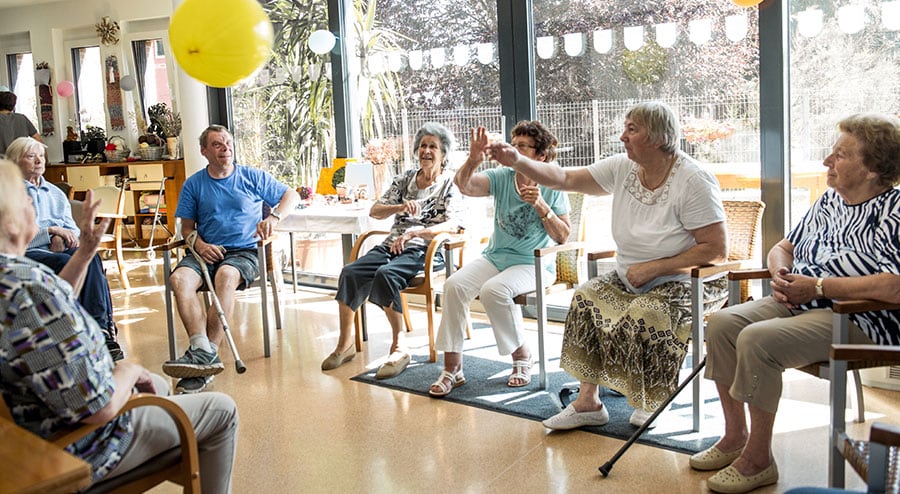Discover the reasons of Assisted Living as a senior care option.
The Function of Assisted Staying In Providing Specialized Take Care Of Dementia Sufferers
The stipulation of specialized look after dementia clients within assisted living centers is significantly acknowledged as a vital component of efficient mental deterioration monitoring. These settings are designed to attend to the unique cognitive and emotional challenges dealt with by people with dementia, using customized support that advertises security and wellness. By integrating structured routines and engaging activities, assisted living can reduce feelings of isolation while boosting total lifestyle. However, the effectiveness of these programs typically hinges on numerous elements, including personnel training and household involvement, motivating a closer evaluation of exactly how these components connect to maximize treatment results.
Comprehending Dementia Treatment Requirements
Recognizing the care requirements of individuals with mental deterioration is important for providing reliable support and improving their lifestyle. Mental deterioration is a modern neurological problem that impacts cognitive features such as memory, reasoning, and interaction. Consequently, people with mental deterioration commonly require help with daily activities, individualized care strategies, and psychological support.
Reliable dementia care includes identifying the special obstacles faced by each individual. This consists of recognizing the phases of dementia, which can vary from moderate cognitive problems to advanced stages needing thorough aid. Care requires might encompass support in handling everyday regimens, drug adherence, and keeping social interactions to protect against isolation.
In addition, sensory excitement and acquainted settings can significantly enhance the wellness of people with mental deterioration. Caretakers must be trained to identify behavioral changes and use methods tailored to every person's preferences and previous experiences. Strategies such as recognition treatment and reminiscence can help communicate efficiently and promote a complacency.
Ultimately, successfully dealing with the care needs of people with mental deterioration needs a caring technique, recurring training for caretakers, and a commitment to maintaining self-respect and regard throughout the caregiving procedure.
Benefits of Assisted Living

Assisted living promotes social interaction among homeowners, promoting a feeling of area and belonging. Involving with peers can alleviate feelings of isolation, which are common in those living with dementia.
On top of that, lots of assisted living centers supply assistance with daily activities, such as medication management, bathing, and meal preparation. This support allows residents to maintain their independence while guaranteeing their wellness and health are focused on. Inevitably, assisted living acts as a beneficial source, stabilizing care and autonomy for people with dementia and their family members.

Specialized Programs and Tasks
(Dementia Care Charlotte)Recognizing the special demands of people with mental deterioration, lots of assisted living centers carry out specific programs and activities developed to enhance cognitive feature and advertise overall well-being. These programs frequently include cognitive stimulation activities that involve homeowners in memory video games, problems, and reminiscence therapy, which encourages the sharing of individual tales and previous experiences.
Additionally, art and songs therapy play substantial functions in fostering creative thinking and psychological expression (Assisted Living). Involving locals in paint, crafting, or music sessions can provide healing benefits, aiding to decrease stress and anxiety and improve state of mind. Exercises, such as mild exercises and dancing sessions, are also critical, as they promote mobility and physical wellness while encouraging social communication among citizens
Organized everyday regimens are frequently developed to provide a feeling of security and predictability for individuals with mental deterioration. These routines can include arranged dish times, group tasks, and individualized care strategies that cater to private passions and abilities. By producing an enriching environment loaded with customized activities, helped living centers not only enhance the lifestyle for mental deterioration patients however additionally cultivate a feeling of area and belonging.
Trained Personnel and Support
(Memory Care Charlotte)In assisted living facilities, the presence of trained personnel is important for providing efficient assistance to individuals with mental deterioration. These professionals have specialized knowledge and abilities to deal with the one-of-a-kind needs of homeowners, ensuring their security, convenience, and well-being. Personnel get training in mental deterioration care, that includes understanding the progression of the condition, recognizing behavioral adjustments, and employing efficient interaction methods.
In addition, qualified team are equipped to execute tailored care plans tailored to every homeowner's preferences and capabilities. This personalized strategy fosters a sense of autonomy and dignity, enabling homeowners to participate in significant tasks that boost their top quality of life. The staff also play an important function in monitoring health and wellness, without delay identifying any kind of changes in condition that may need medical interest.
Along with route treatment, experienced team supply psychological assistance to locals, helping to relieve sensations of complication and anxiousness that often accompany mental deterioration. Their thoughtful strategy develops a caring atmosphere where citizens feel valued and understood - Assisted Living. Ultimately, the competence and commitment of qualified staff are crucial in supplying thorough treatment that satisfies the complex demands of people dealing with dementia in assisted living setups
Family Members Participation and Resources
Family members participation plays a significant role in the treatment of individuals with dementia in nursing home. Engaging relative in the care procedure not only boosts the psychological well-being of the homeowner however also cultivates a collective environment where care strategies can be tailored to specific requirements. Family members can supply important understandings into the choices, history, and actions of their loved ones, which can educate caregivers and bring about more personalized care approaches.
Additionally, assisted living centers commonly provide sources for families, such as support teams and educational workshops. These sources can aid households recognize dementia, improve interaction techniques, and establish coping devices. Involvement in these programs can equip member of the family, furnishing them with the devices necessary to support their liked ones properly.
Additionally, routine interaction in between families and personnel is critical. This recurring dialogue enables families to stay educated concerning their loved one's development and any type of adjustments read review in treatment plans. Ultimately, a strong collaboration between families and helped living centers cultivates a setting of trust and understanding, guaranteeing that individuals with dementia get the specialized treatment they should have while keeping their family connections.
Conclusion
To conclude, helped living facilities play an important function in attending to the special demands of mental deterioration people via customized care and assistance. By cultivating safe atmospheres, advertising social communication, and implementing structured regimens, these centers boost the total health of citizens. The participation of qualified personnel and families further enriches the treatment experience, making certain that specific choices and histories are respected. Ultimately, assisted living provides essential sources that dramatically enhance the high quality of life for those living with dementia.